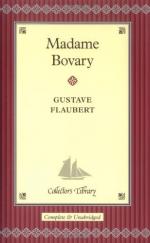|
This section contains 9,041 words (approx. 31 pages at 300 words per page) |

|
SOURCE: "Madame Bovary and the Question of Pleasure," in Flaubert and Postmodernism, edited by Naomi Schor and Henry F. Majewski, University of Nebraska Press, 1984, pp. 116-38.
In the following essay, Porter categorizes Madame Bovary according to the three main types of reading pleasure identified by Roland Barthes in The Pleasure of the Text. Following a Barthian analysis of Madame Bovary, Porter considers the work in relation to its "central theme of the duplicity of language. "
One of the more interesting developments in narrative theory over the past decade or so has been a renewed interest in pleasure. Subsequent to the structuralist enterprise there have grown up a reader-centered, a psychoanalytic, a new textual, and a feminist criticism which in their different ways have been attentive among other things to the experience of the reader reading a literary text and to the subject positions the reader is required to...
|
This section contains 9,041 words (approx. 31 pages at 300 words per page) |

|


